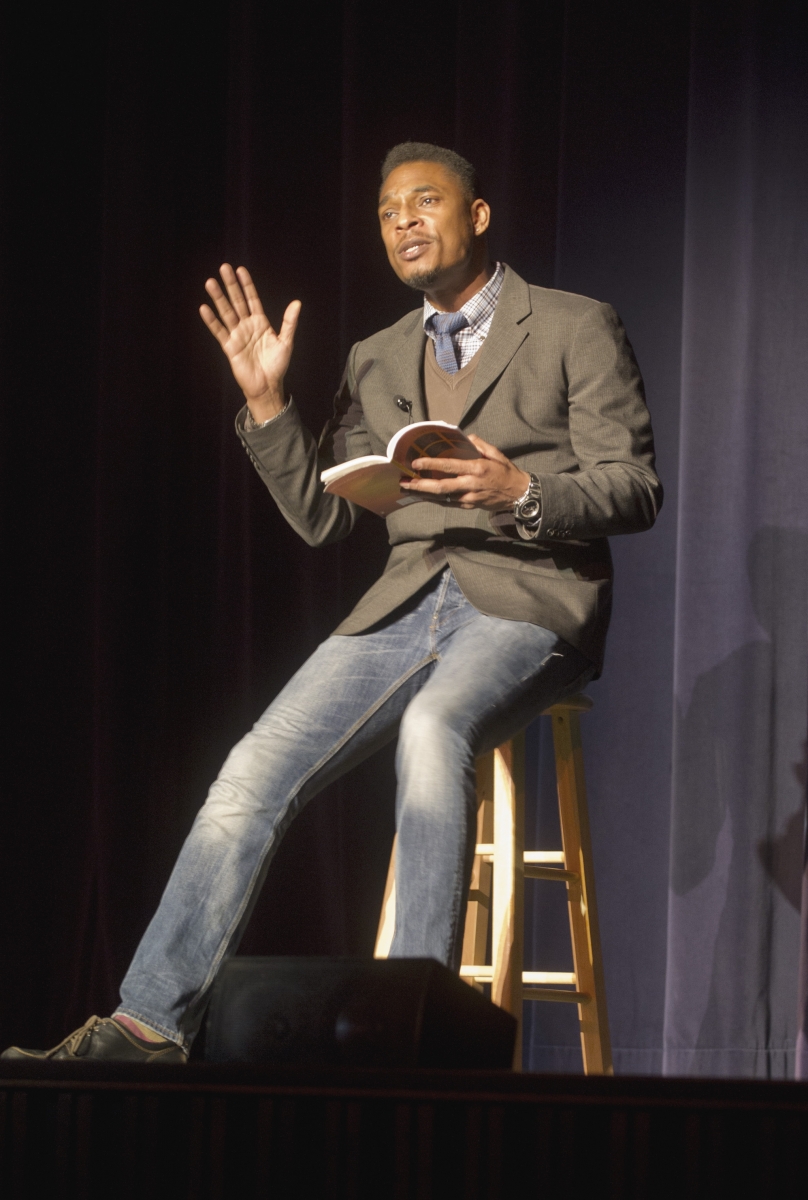Pitt Professor of English Terrance Hayes Recipient of a 2014 MacArthur Fellowship
PITTSBURGH—A University of Pittsburgh professor of English considered to be one of the most compelling voices in American poetry is among the group of 2014 MacArthur Fellows announced today.
Terrance Hayes  has been awarded a $625,000 stipend—sometimes called the "genius grant"—from the John D. and Catherine T. MacArthur Foundation to pursue his artistic, creative, and intellectual activities. Hayes, 42, is an artist and award-winning poet who teaches writing in Pitt's Department of English in the Kenneth P. Dietrich School of Arts and Sciences.
has been awarded a $625,000 stipend—sometimes called the "genius grant"—from the John D. and Catherine T. MacArthur Foundation to pursue his artistic, creative, and intellectual activities. Hayes, 42, is an artist and award-winning poet who teaches writing in Pitt's Department of English in the Kenneth P. Dietrich School of Arts and Sciences.
Hayes says he was in a coffee shop in Highland Park where he resides with his wife, Pitt Assistant Professor of English Yona Harvey, when he received the call from the MacArthur Foundation.
"It was a huge shock," he said. "When they first told me, I immediately thought of five other people who could have received it, some right here in Pittsburgh. There are so many great artists here. Everyone knows that Pittsburgh is a great poetry town. I hope this validates that."
Hayes has authored five collections of poetry. Lighthead (Penguin, 2010) was the winner of the 2010 National Book Award for Poetry; Wind in a Box (Penguin, 2006) was winner of a Pushcart Prize; Hip Logic (Penguin, 2002) won the 2001 National Poetry Series, was a finalist for the Los Angeles Times Book Award, and was a runner-up for the James Laughlin Award from the Academy of American Poets; Muscular Music (Tia Chucha, 1999) won the Kate Tufts Discovery Award and the Whiting Writers Award; and his latest, How to Be Drawn, will be published next year by Penguin Books. When Wind in a Box was named one of the Best Books of 2006 by Publishers Weekly, a reviewer wrote: "in his hip, funny, yet no less high-stakes third collection, Hayes solidifies his reputation as one of the best poets—African American or otherwise—now writing."
Hayes has received many other honors and awards, as well as fellowships from the National Endowment of the Arts and the Guggenheim Foundation.
Hayes added that he always tries to challenge himself and evolve as a writer, and he thinks the MacArthur Fellowship will help that process.
A native of Columbia, S.C., Hayes was educated at Coker College where he studied painting and English and was an Academic All-American on the men's basketball team. He received a Master of Fine Arts in writing from Pitt in 1997. He has conducted poetry workshops in prisons across America, and he taught in southern Japan, Columbus, Ohio, and New Orleans before returning to Pittsburgh in 2001 to join the faculty at Carnegie Mellon University. He joined Pitt's faculty in fall 2013.
In 2011, then Pitt School of Medicine faculty member Elodie Ghedin, a parasitologist and virologist, and Pitt alumnus Kevin Guskiewicz (EDUC ’92G), a faculty member in the Department of Exercise and Sport Science at the University of North Carolina at Chapel Hill, were named MacArthur Fellows. In 1996, Pitt alumnus and trustee William E. Strickland Jr. (A&S ’70) received the same honor for his role as an arts educator and the head of two learning communities, the Manchester Craftsmen's Guild and the Bidwell Training Center.
About the MacArthur Fellows Program Awards
The program, part of the John D. and Catherine T. MacArthur Foundation, is intended to encourage people of outstanding talent to pursue their own creative, intellectual, and professional inclinations. The foundation awards fellowships—a $625,000 stipend paid in quarterly installments over five years—directly to individuals, rather than through institutions. Recipients may be writers, scientists, artists, social scientists, humanists, teachers, entrepreneurs, or those in other fields. There are no limits on age or area of activity. Some recipients use their fellowship to advance their expertise, engage in bold new work, or even to change fields and alter the direction of their careers.
The selection decisions focus primarily on exceptional creativity, as demonstrated through a track record of significant achievement, and promise for important advances in the future. The MacArthur Fellowship is not a lifetime achievement award; rather, the selection committee looks for individuals on the precipice of great discovery or a game-changing idea.
Visit www.macfound.org for biographical information, downloadable photos, and video overviews about each of this year's fellows.
###
9/17/14/klf/cjhm
Media Resources
Schools of the Health Sciences Media Relations
For more information about Pitt's schools of dental medicine, health and rehabilitation sciences, medicine, nursing, pharmacy, and public health, click here >
To locate stories from health science schools prior to 2013, visit the UPMC news archives »
Urgent Question?
University of Pittsburgh news reps are available to answer urgent media inquiries. Outside of regular business hours (Mon-Fri, 8:30 a.m.-5 p.m.), please email us at media@pitt.edu.
News reps for University of Pittsburgh Health Sciences schools can be reached outside of regular business hours through the paging operator at 1+412-647-2345.


